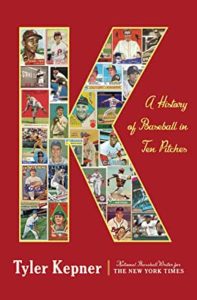 When the decade began, few people were reading books on electronic devices. Smart phone penetration was minimal. It still was common to see people reading physical books rather than phones in public.
When the decade began, few people were reading books on electronic devices. Smart phone penetration was minimal. It still was common to see people reading physical books rather than phones in public.
That’s no longer the case as the decade comes to an end, something I was reminded of again in 2019 as I reached my goal of reading 100 books – 101, actually – after reading 61 in 2017 and 79 last year. The key was to follow the advice of Stephen King in his book On Writing, which I re-read in 2019, and carry a book wherever I went to take advantage of the many opportunities throughout the day to read when forced to wait.
Of course, we mostly turn to smart phones to fill this void. Failing that any waiting area – doctor’s office, auto shop, airline gate – has televisions blaring. Many people in my gym check email and social media in between sets. We now have selfies in church and Instagram posts from yoga class.
In 2019 I often was the only one in a waiting area reading, though it did not go unnoticed. Our sons’ orthodontist noted I always had a book and soon we were comparing reading lists.
My goal with reading 100 books in a year was to see if I could retain some semblance of 2008-like focus and concentration, eschewing 24/7 phone addiction. The result, I’ve found, is that my threshold for entertainment has risen. I saw only two movies in the theater in 2019 and my television viewing consists of little beyond college basketball, where my alma mater created some compelling content by winning a national title.
I gave up on books if they didn’t reel me in within 50 pages. After all, reading an average of two books a week leaves little time for mediocre content. As always, my rule was that I had to read two-thirds non-fiction and that fitness and travel books did not count toward the total.
My reading fell into five categories:
YOUNG ADULT: There’s perhaps no greater parenting challenge than keeping teenagers reading in the world of smart phones and video games. I began reading young adult dystopian fiction with our boys years ago to keep them reading and found I enjoy the genre. In 2019 our oldest re-read the five-book Percy Jackson series, which I read for the first time. We also re-read the last three books of the Gregor the Overlander series by Suzanne Collins, which we find better than her Hunger Games series. We’ll read anything by the great Michael Grant. His three sequels to the Gone series lived up to the originals. His Front Lines trilogy, based in a world where women fought in World War II, seemed like a reach but proved believable. World War II is a popular young adult setting and we enjoyed the works of Alan Gratz (Grenade) and Jennifer A. Nielsen (Resistance).
We allow our guys to read almost anything, especially the works of Florida writers Carl Hiaasen and Tim Dorsey, who combined for just one book in 2019, though Dorsey’s No Sunscreen for the Dead was outstanding.
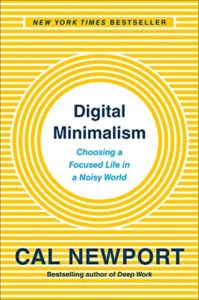 CHILD REARING: As the father of two teenage boys in the digital age, I’m frustrated by the stranglehold smart phones and video games have on kids. There’s no blueprint to draw from, no older parents to turn to for guidance since this is a largely a phenomenon of the last decade. Sure we had video games during my childhood in the 1980s but those either required quarters or were nowhere as addictive as today’s games. Speaking of things that do not resemble the previous generation, the college admissions and financing process is nothing like it was a generation ago. With a high school junior, it’s required a crash course.
CHILD REARING: As the father of two teenage boys in the digital age, I’m frustrated by the stranglehold smart phones and video games have on kids. There’s no blueprint to draw from, no older parents to turn to for guidance since this is a largely a phenomenon of the last decade. Sure we had video games during my childhood in the 1980s but those either required quarters or were nowhere as addictive as today’s games. Speaking of things that do not resemble the previous generation, the college admissions and financing process is nothing like it was a generation ago. With a high school junior, it’s required a crash course.
Fortunately there are plenty of authors cranking out advice on both of these fronts, including Diana Graber (Raising Humans in a Digital World) and The Boy Crisis by Warren Farrell and John Gray. Cal Newport, a computer science professor at Georgetown, is one of my favorite authors and he covers both topics. His book Digital Minimalism is a must-read for anyone looking to break the chains of digital addiction. His book How to be a High School Superstar shows kids why they should avoid jack-of-all-trades, master-of-none college resume padding and become So Good They Can’t Ignore You, the title of Newport’s book about getting into any college.
Andy Ferguson’s Crazy U: One Dad’s Crash Course Getting Kid into College followed his son’s one-year application process and Zac Bissonnette’s Debt-Free U explained how to get through college without debt. The scary thing is that though these two books are less than a decade, the costs have increased 50 percent. Anthony ONeal’s Debt-Free Degree, released this year, is an up-to-date take on the issue. Daniel Golden’s book The Price of Admission was published in 2006 but showed that the celebrity admissions shenanigans that came to light in 2019 is nothing new.
FINANCIAL/MINIMALISM: This is a blog about lean living, after all, and I enjoyed the books of two minimalist bloggers I follow: Joshua Becker (The Minimalist Home) and Courtney Carver (Soulful Simplicity). James Wallman’s Stuffocation: Living More with Less shows how consumerism is destroying our health and our planet. The Gentle Art of Swedish Death Cleaning by Margareta Magnusson explains why we should follow the lead of the Swedes and deal with our crap now to reduce the burden on our loved ones later. Tanja Hester’s Work Optional is another compelling look at the retire early movement. Chris Hogan’s Everyday Millionaires is a modern look at The Millionaire Next Door.
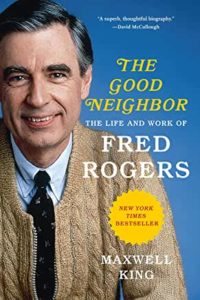 BIOGRAPHY/AUTOBIOGRAPHY: Tom Hanks might win an Oscar for his portrayal of Fred Rogers but Maxwell King deserves an award for his thorough 2018 biography The Good Neighbor. I figured I knew everything about Tina Turner but she held nothing back in her 2018 autobiography My Love Story. When famous people cooperate with a talented writer’s biography, the result is usually awesome. That’s the case with Ashlee Vance’s Elon Musk.
BIOGRAPHY/AUTOBIOGRAPHY: Tom Hanks might win an Oscar for his portrayal of Fred Rogers but Maxwell King deserves an award for his thorough 2018 biography The Good Neighbor. I figured I knew everything about Tina Turner but she held nothing back in her 2018 autobiography My Love Story. When famous people cooperate with a talented writer’s biography, the result is usually awesome. That’s the case with Ashlee Vance’s Elon Musk.
Leah Remini’s Troublemaker is the latest thorough takedown of Scientology. I’m a sucker for autobiographies of wacky folks and was rewarded with Manhood (Terry Crews) and Full Disclosure (Stormy Daniels). Mike Reilly has yelled “You are an Ironman!” at thousands of race finishers and his Finding My Voice is a great read about the triathlon subculture.
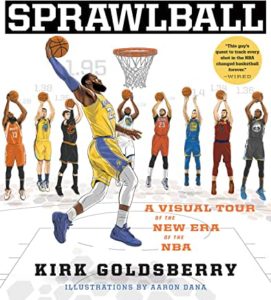 SPORTS: Though I’m no longer a full-time sportswriter, I still follow sports avidly and knew I’d need to read a lot of compelling sports books to reach the century mark.
SPORTS: Though I’m no longer a full-time sportswriter, I still follow sports avidly and knew I’d need to read a lot of compelling sports books to reach the century mark.
I’ve now read most every noteworthy basketball book. My 2019 list included several that belong in the discussion for best-ever, including Alejandro Danois’ The Boys of Dunbar about the early 1980s high school team that included four future NBA players, including Muggsy Bogues; and The Miracle of St. Anthony, where future ESPN insider Adrian Wojnarowski spent a year (2004) with high school coaching legend Bob Hurley. I also re-read Loose Balls, Terry Pluto’s rollicking oral history of the ABA. I can’t believe it took me until 2019 to discover the historical sports narratives of Gary M. Pomerantz. I tackled his The Last Pass: Cousy, Russell, the Celtics and Wilt: 1962, the Night of 100 Points. (I also read what might be his best book, Their Life’s Work, about the 1970s Pittsburgh Steelers.)
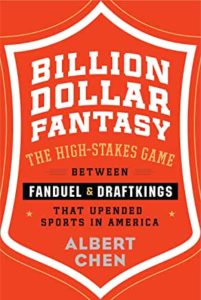 Other great hoops reads included The Last Great Game (Duke vs. Kentucky) by Gene Wojciechowski, Chris Ballard’s The Art of a Beautiful Game, Filip Bondy’s Tip-Off: How the 1984 Draft Changed Basketball Forever, Ian Thomsen’s The Soul of Basketball and Jackie Macmullan’s Basketball: A Love Story. I’ll read anything by the sports investigative tandem of Armen Keteyian and Jeff Benedict and got around in 2019 to Keteyian’s Money Players – Days and Nights in the New NBA and Benedict’s Out of Bounds – Inside NBA Culture of Rape, Violence, Crime. Sam Anderson’s Boom Town is a fascinating history of Oklahoma City and the acquisition of an NBA franchise. If you wonder how the NBA transformed in the last decade into a data-driven, three-point obsessed game, Kirk Goldsberry explains it well in Sprawlball – A Visual Tour of the New Era of the NBA.
Other great hoops reads included The Last Great Game (Duke vs. Kentucky) by Gene Wojciechowski, Chris Ballard’s The Art of a Beautiful Game, Filip Bondy’s Tip-Off: How the 1984 Draft Changed Basketball Forever, Ian Thomsen’s The Soul of Basketball and Jackie Macmullan’s Basketball: A Love Story. I’ll read anything by the sports investigative tandem of Armen Keteyian and Jeff Benedict and got around in 2019 to Keteyian’s Money Players – Days and Nights in the New NBA and Benedict’s Out of Bounds – Inside NBA Culture of Rape, Violence, Crime. Sam Anderson’s Boom Town is a fascinating history of Oklahoma City and the acquisition of an NBA franchise. If you wonder how the NBA transformed in the last decade into a data-driven, three-point obsessed game, Kirk Goldsberry explains it well in Sprawlball – A Visual Tour of the New Era of the NBA.
Marcus Thompson has covered the Golden State Warriors for years and produced compelling biographies of Steph Curry (Golden) and Kevin Durant (K.D.) ESPN’s Brian Windhorst has built a career around covering LeBron James and his LeBron, Inc. is a fascinating look at how the player and his close-knit handlers manage his career. Jock autobiographies are notoriously sanitized but Lamar Odom was surprisingly candid about college recruiting, sex, and the Kardashians in Darkness to Light.
Other sports books I enjoyed included Darren Rovell’s Gatorade history First in Thirst and Inside the Empire, Bob Klapisch and Paul Solotaroff look at the New York Yankees of recent years. I read two autobiographies by sports figures who cut their careers short over concussion concerns: Dale Earnhardt, Jr.’s Racing to the Finish and Mind and Matter, written by MIT mathematician and former NFL lineman John Urschel.
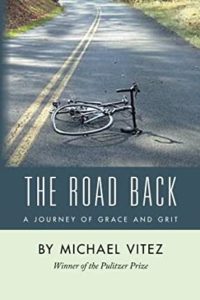 Rob Neyer’s Power Ball, the baseball version of Sprawlball, explains how data and the obsession over home runs and strikeouts have transformed baseball. Albert Chen’s Billion-Dollar Fantasy, an insider account of FanDuel, Draft Kings and the emergence of daily fantasy, is an impressive piece of reporting. Before 2019 I had never read any of Tony Dungy’s books, figuring that living here in Tampa Bay for 20 years I knew all of his stories, but there’s a reason Quiet Strength and Uncommon are best sellers. Also inspirational is Tom Friend’s telling of the story of baseball coach Rich Donnelly’s The Chicken Runs at Midnight and The Road Back, a book I re-read by Michael Vitez about a University of Virginia swimmer who miraculously survived a bike crash and became an Ironman triathlete (and later a physician).
Rob Neyer’s Power Ball, the baseball version of Sprawlball, explains how data and the obsession over home runs and strikeouts have transformed baseball. Albert Chen’s Billion-Dollar Fantasy, an insider account of FanDuel, Draft Kings and the emergence of daily fantasy, is an impressive piece of reporting. Before 2019 I had never read any of Tony Dungy’s books, figuring that living here in Tampa Bay for 20 years I knew all of his stories, but there’s a reason Quiet Strength and Uncommon are best sellers. Also inspirational is Tom Friend’s telling of the story of baseball coach Rich Donnelly’s The Chicken Runs at Midnight and The Road Back, a book I re-read by Michael Vitez about a University of Virginia swimmer who miraculously survived a bike crash and became an Ironman triathlete (and later a physician).
My favorite book of the year was K: A History of Baseball in Ten Pitches. Tyler Kepner rounded up most every living pitcher of note, including several who notoriously shun the media, and crafted a compelling look at not only the art of pitching but the history of the game.
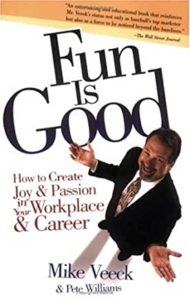 I re-read nine books in 2019, including Fun is Good, the business motivational book I had the honor of writing with baseball marketer Mike Veeck in 2004. Mike’s daughter Rebecca suffered from retinitis pigmentosa and Batten disease and was featured in the book. Rebecca passed away in September at age 27. Though she was blind at a young age, she read hundreds of books via books-on-CD. Reading 100 books with perfect vision, or at least middle-age vision and reading glasses, is a more modest accomplishment.
I re-read nine books in 2019, including Fun is Good, the business motivational book I had the honor of writing with baseball marketer Mike Veeck in 2004. Mike’s daughter Rebecca suffered from retinitis pigmentosa and Batten disease and was featured in the book. Rebecca passed away in September at age 27. Though she was blind at a young age, she read hundreds of books via books-on-CD. Reading 100 books with perfect vision, or at least middle-age vision and reading glasses, is a more modest accomplishment.
Here’s the list of 101 books read, in order completed. Not sure if I’ll reach 100 in 2020, but if you’ve read this far and have suggestions, please let me know.
*Fiction
*Gregor the Overlander/Curse of the Warmbloods – Suzanne Collins (Jan.1)
*Gregor the Overlander/Marks of Secret – Suzanne Collins (Jan. 2)
*Gregor the OverlanderCode of Claw – Suzanne Collins (Jan. 3)
The Good Neighbor (Fred Rogers) – Maxwell King (Jan. 7)
*No Sunscreen for the Dead – Tim Dorsey (Jan. 23)
*Percy Jackson/The Lightning Thief – Rick Riordan (Jan. 24)
*Percy Jackson/The Sea of Monsters – Rick Riordan (Jan. 26)
*Percy Jackson/The Titan’s Curse – Rick Riordan (Jan. 31)
Best American Sports Writing 2018 – Jeff Pearlman, editor – (Feb. 10)
Troublemaker – Leah Remini (Feb. 15)
*A Time to Kill – John Grisham (Feb. 20)
*Sycamore Row – John Grisham (Feb. 24)
Racing to the Finish: My Story – Dale Earnhardt Jr. (Feb. 26)
Digital Minimalism – Cal Newport (March 1)
Everyday Millionaires – Chris Hogan (March 1)
The Minimalist Home – Joshua Becker (March 3)
Full Disclosure – Stormy Daniels (March 4)
Golden: The Miraculous Rise of Steph Curry – Marcus Thompson (March 7)
*Grenade – Alan Gratz (March 10)
Republicans Buy Sneakers, Too – Clay Travis (March 16)
Duped – Abby Ellin (March 19)
The Chicken Runs at Midnight – Tom Friend (March 23)
The Price of Admission – Daniel Golden (March 30)
On Writing – Stephen King – (April 1)
*Elevation – Stephen King – (April 3)
*Code of Honor – Alan Gratz – (April 6)
Inside the Empire – Bob Klapisch and Paul Solotaroff (April 12)
Soulful Simplicity – Courtney Carver (April 16)
Work Optional – Tanja Hester (April 17)
Running Outside the Comfort Zone – Susan Lacke (April 19)
Anger Kills – Redford Williams & Virginia Williams (April 21)
Quiet Strength – Tony Dungy (April 24)
The Subtle Art of Not Giving a F*uck – Mark Manson (April 26)
*The Brooklyn Nine – Alan Gratz (April 27)
Uncommon – Tony Dungy (April 28)
*Ban this Book – Alan Gratz (April 30)
Manhood – Terry Crews (May 3)
*Percy Jackson/The Battle of the Labyrinth – Rick Riordan (May 9)
LeBron, Inc. – Brian Windhorst (May 10)
*Percy Jackson/The Last Olympian – Rick Riordan (May 13)
Money Players – Days and Nights in the New NBA – Armen Keteyian (May 18)
Out of Bounds – Inside NBA Culture of Rape, Violence, Crime – Jeff Benedict (May 18)
All the Way – My Life in Four Quarters – Joe Namath (May 19)
Basketball: A Love Story – Jackie MacMullan (May 26)
Finding My Voice – Mike Reilly (June 1)
*Beach House – James Patterson (June 5)
KD: Kevin Durant’s Relentless Pursuit to be the Greatest – Marcus Thompson (June 17)
My Love Story – Tina Turner (June 21)
Sprawlball – A Visual Tour of the New Era of the NBA – Kirk Goldsberry (June 25)
Raising Humans in a Digital World – Diana Graber (June 29)
Boom Town (Oklahoma City)– Sam Anderson (July 10)
The Soul of Basketball – Ian Thomsen (July 14)
*The Fifth Assassin – Brad Meltzer (July 17)
First in Thirst (Gatorade) – Darren Rovell (July 19)
Boys among Men: How Prep-to-Pro Gen Redefined NBA – Jonathan Abrams (July 23)
*The Reckoning – John Grisham (July 25)
Profitable Podcasting – Stephen Woessner (July 25)
Elon Musk – Ashlee Vance (July 28)
Forever Green – Chuck Leavell (July 28)
*Foul Shot – Doug Hornig (July 29)
Killing the SS – Bill O’Reilly & Martin Dugard (August 3)
Darkness to Light – Lamar Odom (August 6)
How to be a High School Superstar – Cal Newport (August 9)
So Good They Can’t Ignore You – Cal Newport (August 14)
Loose Balls – Terry Pluto (August 17)
*Awakened – James S. Murray/Darren Wearmouth (August 19)
*The Brink – James S. Murray/Darren Wearmouth (August 20)
Mind and Matter – John Urschel (August 24)
K: A History of Baseball in Ten Pitches – Tyler Kepner (August 28)
Crazy U: One Dad’s Crash Course Getting Kid into College – Andy Ferguson (Sept.1)
*Resistance – Jennifer A. Nielsen (Sept. 2)
The Boys of Dunbar – Alejandro Danois (Sept. 7)
*Words on Fire – Jennifer A. Nielsen (Sept. 8)
The Miracle of St. Anthony – Adrian Wojnarowski (Sept. 15)
*The Whistler – John Grisham (Sept. 17)
The Art of a Beautiful Game – Chris Ballard (Sept. 27)
Tip-Off: How the 1984 Draft Changed Basketball Forever – Filip Bondy (Sept. 29)
One Million Followers – Brendan Kane (Oct. 2)
*Swimsuit – James Patterson (Oct. 7)
The Last Great Game (Duke vs. Kentucky) – Gene Wojciechowski (Oct. 11)
The Last Pass: Cousy, Russell, the Celtics – Gary M. Pomerantz (Oct. 16)
*Black Book – James Patterson (Oct. 17)
*Mistress – James Patterson (Oct. 20)
Their Life’s Work (1970s Pittsburgh Steelers) – Gary M. Pomerantz (Oct. 26)
*Front Lines – Michael Grant (Oct. 27)
Power Ball – Rob Neyer (Nov. 5)
Billion-Dollar Fantasy – Albert Chen (Nov. 10)
*Silver Stars – Michael Grant (Nov. 14)
Wilt: 1962, the Night of 100 Points – Gary M. Pomerantz (Nov. 15)
*Purple Hearts – Michael Grant (Nov. 17)
Debt-Free U – Zac Bissonnette (Nov. 21)
The Gentle Art of Swedish Death Cleaning – Margareta Magnusson (Nov. 28)
*Hero – Michael Grant (Dec. 1)
The Road Back – Michael Vitez (Dec. 5)
*Plague Land: No Escape – Alex Scarrow (Dec. 7)
Fun is Good – Mike Veeck and Pete Williams (Dec. 13)
Stuffocation: Living More with Less – James Wallman (Dec. 14)
*Calico Joe – John Grisham (Dec. 15)
David and Goliath – Malcolm Gladwell (Dec. 19)
Debt-Free Degree – Anthony ONeal (Dec. 22)
The Boy Crisis – Warren Farrell & John Gray (Dec. 27)
